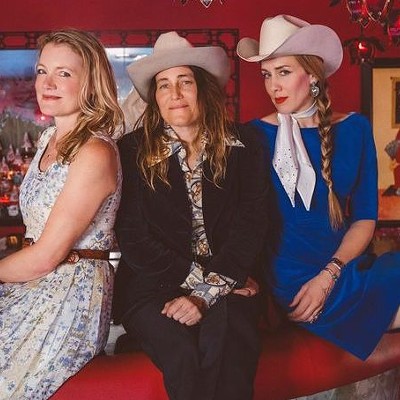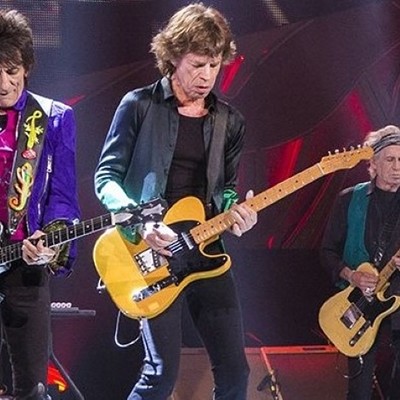While aggression against women may have been overlooked or written off as a gimmick in the 1970s and '80s, in 2015 metal's derogatory lyrical content is only one of the problems that need to be addressed. Many bands either openly encourage violence against women or fail to support legitimate female fandom, but it certainly doesn’t end there. Female metal bands are rarely booked on national tours and practically ignored by the media — and worse, the ones who make it that far get ridiculed or sexualized.
The fact is, metal is long overdue for an overhaul. Its lyrical themes of anti-establishment struggles and pervasive gloom may prevail, and certainly the musical style is non-negotiable, but its exclusion of women and rampant sexual aggression needs a serious reckoning.
Go ahead, boys, dig your Slayer Vans in the sand, but if metal doesn’t change to reflect its more diverse audience, it could vanquish itself into irrelevancy. Do you really think excluding women will further metal as a sustainable art? No. Keep excluding women, and it will be a dead genre in 50 years — or an outdated, embarrassingly nostalgic subclass of musical racism and sexism.
Even metal fandom is exclusive. Women who are metal fans come under the constant scrutiny of male metal fans, and have their motives questioned. They're either assumed to be a poser or a girlfriend, no more than a fan by association. Often they must prove their fandom to suspicious men who require authenticity. Ridiculous.
Metal is fast, aggressive and angry, but that doesn’t mean it can’t appeal to women. In fact, it appeals to many people because (believe it or not) these characteristics have been scientifically proven to be a psychological benefit. Women have every right to be at a metal show, whether on the stage or in the pit. And none of them have to prove themselves to anyone...ever.
For many years, metal’s message to women has been one of assignment: you can be a groupie, but not a fan or serious musician. It has failed to support women in any capacity besides as live props — objects, not subjects. It's also guilty of encouraging a Hooters-like, bikini-model, stripper-girl atmosphere in general. And while there’s nothing wrong with women in bikinis, there is something wrong if that’s the only role metal will allow them to play. Keep in mind, this is 2015.
Female Musicians Need Not Apply
But it’s not just fandom where groups are marginalized and subjugated. Female metal musicians face a tougher climb to the spotlight than male musicians. Worse, women rarely headline a heavy-metal tour; this past spring's Halestorm/Pretty Reckless tour being the exception that proves the rule. But this year's Rockstar Mayhem Festival hosted 13 bands, with two female band members between them: Reba Meyers of Code Orange and Liv Jagrell of Sister Sin. Both appeared on the Victory Records side stage; no female musicians were on the main stage. The Vans Warped Tour did considerably better, but women were still tokens. Much has already been said about their absence in the summer’s largest touring package.
Perhaps the closest a female-fronted act came to headlining a metal package was Halestorm at Rocklahoma. That festival, held this past May east of Tulsa, amazingly hosted at least five bands with female members...out of more than 100. (Did I mention it's 2015?)
While promoters certainly fail women, most media coverage of female metal musicians merely treats them as novelties. As it persists in seeing them as unconventional or worse, in purely sexual terms, women are still not equal. Instead they are either called out for perceived “slutty” clothing or not covered at all due to being (allegedly) not sexy enough.
Women can’t win. What coverage female musicians do get often focuses on sideshow, gimmicky crap. For example, BABYMETAL — a band only a pedophile could love — gets more press than many outstanding women musicians. Too many women whose talents are spotlight-worthy remain unknown. Can you name 20 metal acts with at least one female member? Ten? Even five? Didn’t think so.
Furthermore, metal media coverage is thoroughly guilty of Male Gaze: metal media outlets believe their target audience is male-exclusive, and continue to design articles, content and coverage around that false perception. That’s easy to do when your journalists are all white males.
And even if metal fans are principally male, why are they reluctant to cheer for a female-fronted band? Never fail to understand this: because being a fan is an act of submission. It’s the same reason men can't wait destroy a successful female player in a live-action role-playing video game. Lower-ranked males despise the disruption in hierarchy represented by a successful female. They’re jealous, and don’t want to give up power.
Or worse, they either fail to see the common humanity in a female or believe they’re just not worth hearing. The empathy gap in metal is so enormous that the problem is systemic. Until metal fans can appreciate metal for the music and not just who plays it, metal will remain the dark fraternity it is.
And, of course, lyrically speaking, metal has a big problem with its promotion of rape.
True, that’s not always the case, and not every single song is about raping women (and children). But even if those themes are only occasional, isn’t even one song promoting rape one too many?
Why are bands writing these uber-violent themes anyway? Shawna Potter, vocalist of the Baltimore-based feminist punk band, War On Women says, "When men in bands write misogynistic or sexist lyrics, they're just writing what they know. Society has shaped us to believe that women are second-class citizens, here [on Earth] for men's pleasure and that men are entitled to women's bodies."
The problem is nobody is taking offense to these violent lyrical themes. And if they are, they're not speaking up about it. Alice Cooper was once quoted as saying, “There's more blood in Macbeth than in my shows, and that's required school reading."
Yet there’s a stark contrast between the macabre theatrics of Cooper's guillotine and lyrics that detail physically ripping open a woman through forced sexual contact and watching her die as a result. And even if Macbeth was bloody, it was a statement on the will to power and the attraction to corruption...and did Alice Cooper just compare himself to Shakespeare?
In response to the backlash against ultra-violent lyrics, Cannibal Corpse singer George Fisher said, “We don't sing about politics. We don't sing about religion." He continued:
Yeah, it's about killing people, but it's not promoting it at all. Basically these are fictional stories and that's it. And anyone who gets upset about it is ridiculous…when I see these people bitch about video games like Grand Theft Auto: Vice City and Manhunt, and how violent they are. Hey listen, man — it's fiction. It's fiction. [When people say] "How can you do that type of music?" Because I know it's fiction! If some kid can't tell the difference between reality and fiction, then he's got a problem. And that could be attributed to his parents. It's time that people start taking some responsibility.
Sure. If you sing about celebrating murder, you are promoting it. And when you sing something, from oh, let’s say, “Butchered at Birth” — "Mother ripped apart/ Smashing in her face/ My knife cutting holes/ Fucking her remains" — then you own it. You are responsible for it because you created it. Cut the doublespeak, already.
Lyrical Shifts
Believe it or not, some bands do self-correct. Some men will stand up for women and understand that women can be equal partners in artistic expression, even in death metal. We love those men.
Speaking to Andy Marsh, guitarist for Thy Art Is Murder, he makes no attempts at backpedaling or defending the lyrical content of his band's 2008 release, Infinite Death, which contains lyrics like, "I'm inflicting bloodshed upon bitches/ just because I hate the female race...women were born to be fucked." In fact, he agrees they were abhorrent, and his level of discomfort with the band's previous sexism was apparent.
"I was not in the band [when those lyrics were written]," he says today. "And 100 percent that's [misogyny]...something I could never get behind [while being] in the band."
When asked if they will ever play lyrics about raping, torturing and murdering women again, Marsh demurs:
It's one of those things where you become known for them early on in your career and then either the artists grow sick of them or maybe they're embarrassed by them, and then they write better songs. Or they just move into a different style. We don't like playing those songs and we choose not to play those songs, but occasionally we may perform them for the fans, but we don't enjoy it. I'd say we'd played stuff off the Adversary and Infinite Death only a handful of times in the past three years.
Even Whitechapel, due at Houston's Scout Bar next Monday, has followed suit. The band responsible for such lyrics as "I ripped her fucking limb from limb," from 2006 LP Somatic Defilement ("Vicer Exciser"), has now turned away from misogynistic lyrical content. It wasn't easy move for a band named after the area of London where Jack the Ripper murdered at least five women, but the band felt it was a necessary move. (Right on.)
"We wanted something more mature," says guitarist Alex Wade about the changes in Whitechapel's content. "As we get older, we're [aware] of how we want to represent ourselves with the band. When we were younger, we didn't care if we had crazy lyrics...well, now it's like, I'm 29 years old and I love my mother, so... I don't want to put stuff out there that she would read and be like, 'Alex, what are you doing?'"
Some bands simply use the violent imagery of their artwork for shock value only. Houston's own Diminished uses some of the most offensive and grotesque artwork ever witnessed with pictures of women in bondage, raped, bound or dismembered to illustrate song titles like "Regurgitating Rotten Semen." Controversy is not new to them, and their Facebook page has been reported for supporting graphically violent content.
"Look, my own mother hates the band," explains vocalist Michael Pinkard. "It's just not her style. We want to get a reaction out of people. We consider ourselves part of the horror genre. We're here to be upsetting and violent. But I also don't want to be painted unfairly. We sing about political issues, too. We have an entire album called Origin of Apocalypse about war [and] politics — you know, stuff that isn't so rape-y towards women."
When pressed further if Diminished's artwork promotes rape, Pinkard responded with, "Nope. I have a girlfriend and a daughter, I'd never promote that."
But would the band ever stop singing about violence against women?
"Our lyrical subjects change," Pinkard says. "You know, you have 60 songs about rape and murder, it gets old. You have kids, life happens, you become more mature, you know lyrics change. We mature, our songs mature."
While some bands incorporate gratuitous imagery for the sake of promotion, can fans make the separation? Especially when fans make memes like this? Doubtful.
Who Will Save Women?
Metal is not alone in its ostracism of women — its close cousin, punk rock, was completely revamped 20 years ago. Back in the '90s, female punk fans and musicians are credited for riding the third wave of feminism and forming their very own subgenre, Riot Grrrl, with bands like Bikini Kill, Bratmobile and L7, a spirit that even surfaced in Russia a generation later with the rise of Pussy Riot. When those women wanted opportunities in the punk scene that didn’t already exist, they simply created them. Yet even that scene wasn't created in a vacuum.
It's not just women who need to fight misogyny in music. War On Women's Shawna Potter encourages men to take up the battle as well.
"While women [with people of color and the LGBQT community] must fight for our rights and humanity, men must also fight," she says. "They must [fight] against the insulting notion that they are animals have no self-control. But first, they must see it as insulting, I suppose.
"I can't speak about all genres of music, but many [rock] bands started out as protest music; music meant to call out those in power and challenge the status quo," Potter adds. "Well, there's nothing more status quo than sexism, so if they really wanted to be punk...they'd fight those ideals by championing equality and justice, putting victims of gender-based violence first."
Know this: metal's female musicians and fans will keep claiming a role in the music we love, because we deserve to be here too. Our presence in all categories will continue to grow. We will not go away, we will not remain as props or objects. We have a voice and we will be heard. Women will take their equal share, not because men will relinquish it to them but because it's already theirs. As Kurt Cobain so beautifully predicted in 1994, “The future of rock belongs to women."
And besides, it’s already 2015.






